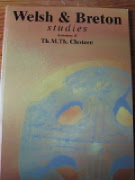
Welsh & Breton studies in memory of Th.M.Th. Chotzen; Proceedings of a Colloquium organized by the A.G. van Hamel Foundation for Celtic Studies Utrecht-Amsterdam 23-24 April 1993. Utrecht: The Celtic Dragon (St.Uitgeverij de Keltische Draak ), 1995. (Studia Hameliana i). ISSN: 1382-4570; ISBN 90 802785 1 3 / 3 89323 073 4. EURO 11.50.

The death of Dr Theo Chotzen in February 1945 was the consequence of his work in the Dutch Resistance and a great loss for the study of Celtic languages and literature. His thesis Recherches sur la poésie de Dafydd ab Gwilym, barde gallois du XIVe siècle (Amsterdam: Paris, 1927) testi_es to the stature of this scholar and has remained a classic. In april 1993, a Celtic Colloquium was dedicated to Chotzen's work. Now, more than fifty years after his tragic death, the Stichting Uitgeverij de Keltische Draak has published papers read at this colloquium.
The content of the book is as follows:
Maartje Draak, Theodoor Max (Thomas) Chotzen
Maartje Draak, professor of Celtic from 1946 until 1977, knew Chotzen and has worked with him. She gives a brief outline of his life and work.
R. Bromwich, Dafydd ap Gwilym
This article discusses the characteristics and qualities of Dafydd ap Gwilym's poetry, and indicates with examples how far his work expresses the traditional features of medieval Welsh poetry, and for what innovations he was responsible, alike in metrical form, in style, and in subject-matter. Dr. Bromwich examines the contribution made by Dr. Theodor Chotzen to the study of the poet in relation to earlier studies, and discusses briefly the nature of Dafydd ap Gwilym's borrowings from continental literature. Bromwich outlines the more recent discoveries which have come to light since Chotzen's day concerning the poet's life and background. She gives a brief account of Barddoniaeth Dafydd ap Gwilym (1789), the early printed edition of the poet's work, which was the only full collection available to Chotzen. Finally Bromwich outlines the main changes which have been made to our conspectus of Dafydd ap Gwilym and his poetry by the publication of Thomas Parry's magistral edition of the poet's work in 1952.
Gerald Morgan, The Landscape of Dafydd ap Gwilym
Although Dafydd ap Gwilym was a poet whose themes are drawn from a European stock, and whose work quickly became popular throughout his native Wales, although the landscape he knew has changed virtually beyond recognition, and although we know so little of his life story, nevertheless it can be helpful to examine the placenames in his poetry, and to review what we know of the society in which he lived - a society of subsistence farmers, ruled over by officers of the English Crown, many of whom were drawn from Dafydd's own social milieu.
Morfydd Owen, The Archaism of the Welsh Poetic Tradition
Many scholars including Dr. Chotzen have emphasised the innovatory nature of Dafydd ap Gwilym's poetry. Yet when Dafydd ap Gwilym sang praise poetry to his noble male patrons he inherited much from the traditions of his bardic predecessors. This article tries to show the nature and wealth of those traditions by dealing with the form, the subject matter, and attitudes which typify the poetry of the twelfth and thirteenth century and trying to indicate at the same time some of the great changes in Welsh poetry which the fourteenth century saw and which are to be witnessed in Dafydd's poetry.
Pierre-Yves Lambert, The Breton theatre manuscripts and François-Marie Luzel
François-Marie Luzel (1821-1895) had an impassionate interest in the manuscripts of Breton theatre. He started very young to collect such manuscripts, walking from farm to farm in the Tregor county. When he could not buy them, he used to borrow them to make a copy. One of his aims was to reach celebrity by publishing a kind of anthology of Breton theatre. He obtained scholarships from the Minister for Education in order to collect these manuscripts, in 1845, and twice during the year 1864. His mission reports, still unpublished, give valuable information about the circumstances in which Luzel acquired some of his manuscripts. They also cast some light on the cultural life of Breton peasantry. Luzel had to hand over some of the manuscripts to the Bibliothèque Impériale in 1864 en 1865. Later, his main interest was rather Breton folklore, but he kept studying Breton dramas and lead his disciple Anatole le Braz to write a thesis on Breton theatre. Most of the manuscripts kept in public libraries come from his collections.